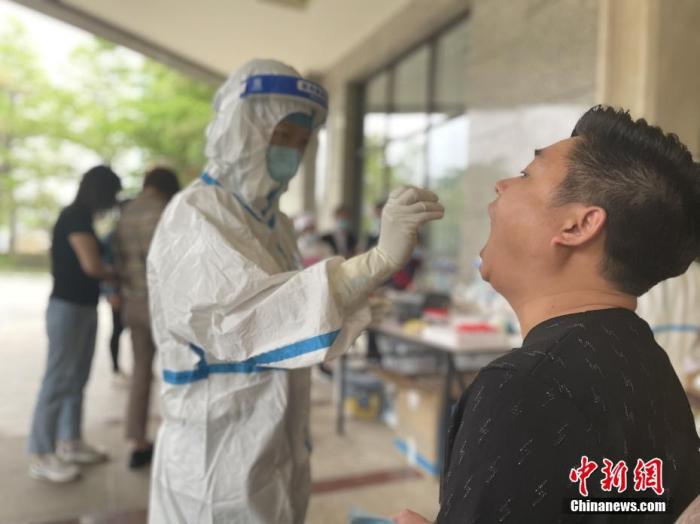(Fighting New Coronary Pneumonia) Directly hitting the "war epidemic" in Ruili on the border between China and Myanmar: nearly 210,000 nucleic acid tests completed in 12 hours
China News Agency, Ruili, April 1st, title: Directly hitting the "war epidemic" in Ruili on the Sino-Myanmar border: nucleic acid testing of nearly 210,000 people completed in 12 hours
Author Miao Chao
In Ruili City, Dehong Dai and Jingpo Autonomous Prefecture, Yunnan Province, 12 new confirmed cases and 26 new asymptomatic infections were added from March 30 to 31.
The epidemic is sudden, and to win this battle against the epidemic, it is the key to find out the number of infected people to the maximum.
On the morning of March 31, Ruili City Deputy Mayor Yang Mou said, “We plan to complete the nucleic acid testing and sampling for all employees in Ruili City in one day.”
On March 31st, Ruili citizens lined up for nucleic acid testing.
Photo by China News Agency reporter Miao Chao
Ruili City, located in the southwestern border of China, borders Myanmar and is the port with the largest flow of people, vehicles, and goods on the China-Myanmar border.
It is understood that Ruili has a population of nearly 21,500.
How to complete such a large-scale nucleic acid test within 24 hours?
The reporter visited Ruili City on March 31 and found that Ruili City had prepared before launching full-staff nucleic acid testing.
On March 28, Ruili City carried out routine nucleic acid testing and sampling of key populations in Jiegao Yucheng, and found 1 case of a Burmese person who tested positive for nucleic acid. Therefore, on the 29th, all members of the Guomen community where Jiegaoyucheng was located were sampled for nucleic acid testing.
Gong Yunzun, secretary of the Ruili Municipal Committee of the Communist Party of China, said that since the initiation of nucleic acid testing in the Guomen Community of Ruili City, Ruili City has organized 12 hospitals and a third-party testing agency to purchase and reserve 250,000 sampling tubes and 250,000 throat swabs in advance.
In order to win the battle against epidemic prevention and control at the “national gate”, Yunnan Province mobilized medical staff from the surrounding counties and cities of Ruili City and the city to form 16 sampling teams of 1,877 people, with support from all parties. In order to set up 419 samples in the city Fixed sampling points and 6 flow modulation sampling points.
On March 31, citizens of Ruili received a nucleic acid test.
Photo by China News Agency reporter Miao Chao
“We received a notice to support Ruili late at night on the 30th and immediately assembled and set off.” Zhao Shixing, a doctor at the Maternity and Child Health Hospital of Eryuan County, Dali Prefecture, Yunnan Province, told reporters at a nucleic acid test site that they rushed late at night and arrived in Ruili early on the 31st. I have been working on nucleic acid testing since the morning, and only have a half-hour meal break at noon."
In addition to the medical teams that came to support from all directions, a group of epidemic prevention teams called "grid members" also played a key role. They notified Ruili residents overnight to prepare for information registration and other nucleic acid testing.
Grid members are local "enthusiastic citizens" who are usually responsible for assisting the government to contact the people.
A grid member is responsible for contacting about 10 households, and there are more than 3700 grid members in Ruili City, which realizes grid management.
The 62-year-old Dai woman called Na to be a grid worker in Mengmao Village, Ruili City. “I called overnight to tell everyone that I will try my best to isolate at home in the near future, wear a mask when I go out, and wash my hands frequently when I go home. Tomorrow (March 31) Everyone has to be tested for nucleic acid, and the location is also informed."
During the daytime on March 31, the reporter visited Ruili City and found that the number of people and vehicles on the street has been significantly reduced, most shops are closed, the supply of materials is stable, and the market price is stable. Local residents are conducting nucleic acid testing and sampling in an orderly manner.
At a press conference held on the evening of the 31st, Gong Yunzun told the media that as of 20:00 on March 31, Ruili had collected a total of 207,136 nucleic acid samples.
In just 12 hours, Ruili City was close to completing the inspection of all employees.
(Finish)

